It still hurts.
I'll probably be saying that for weeks, if not most of the summer, but it's true. Getting so close to the Cup and not winning it is agonizing. And that's true regardless of what a lot of people are going to say in the aftermath of the Penguins Cup Final loss -- the Penguins had a great season .. they came very far in a short time .. they have a good chance of being a contender for many years because of their young talent.
Blah, blah, blah.
I don't want to hear that right now. All of that is probably true, of course. The Penguins accomplished a lot this year -- more than I expected. They did come very far in a short time. And, even if they sustain a few free agent losses (something probably likely), they have a good chance of being a contender for a while.
But there will be plenty of time later to put into proper perspective how fast their growth curve has progressed. Right now, I remain stuck on the fact that the Penguins lost in the finals.
Notice I didn't say Detroit won.
That's right. The Penguins lost. Contrary to popular opinion, I believe the Penguins were more than capable of beating the Red Wings. The Cup was there for them to take ... this year ... right now ... with all their young talent.
And that's true regardless of how well Detroit played. Make no mistake. The Red Wings played extraordinarily well. The Penguins didn't get a break having to face-off against them for the Cup. They were the best team in the league in the regular season and, for the most part, validated that record in the playoffs. They were a seasoned opponent that plays their system diligently.
But without taking anything away from Detroit, I don't believe the Penguins lost because the Red Wings were a superior team. They played better in the series, but that's different than being the better team. A lot of observers inappropriately mix the two.
Here are the reasons the Penguins lost out on carrying the Cup to the Red Wings, in no particular order:
1) Evgeni Malkin was a non-factor: After the final, it was revealed that Malkin was ill for the second part of the Flyers series and the first few games against Detroit. He supposedly couldn't keep food down. There also remained speculation (although not confirmed anywhere as far as I could tell) that he was suffering from some sort of injury as a result of the crushing hit he took into the wall behind the net from Philadelphia Flyers Center Mike Richards in game 1 of the Eastern Conference Final, right before he scored his 2nd goal on the breakaway slapshot he blew by Flyer goalie Martin Biron. Regardless of the reason, Malkin had only 3 points in the final, and didn't get on the scoresheet until the game 5 overtime power play winner by Petr Sykora.
When Malkin isn't a factor, his linemates, Sykora and Malone aren't either. Sykora had one point in the final (his winner in game 5) and Malone didn't score a single goal. For as solid as both are, they rely on Malkin to get them the puck (in Sykora's case) and to take advantage of the space they create (in Malone's case). Malkin makes that line hum, and when he's got nothing, Sykora and Malone aren't the type of players who can generate offense on their own. So when Malkin is a non-factor, the Penguins' entire second line goes in the toilet, allowing defenses to focus on Sidney Crosby's line. That's exactly what happened against the Red Wings. And it made a difference, because for as good as Detroit is systematically through all 4 lines, Henrik Zetterberg really is light-years above even the Red Wings other known defensive players. Kris Draper is one of those, and Draper was matched up against Malkin for a lot of the series. If Geno was rolling, he would have gotten the better of that matchup, and that's something the Penguins needed to beat Detroit. Malkin was a beast all season, and will continue to be for the Penguins (hopefully) for many years, but he didn't get it done for Pittsburgh when it mattered most. That's not to be overly critical -- it just states a fact
2) The Penguins didn't get enough scoring from their depth players: Late in the series, Pittsburgh's depth started to come around a little. Max Talbot scored. Adam Hall scored. But most of the offense the Penguins generated in this series was through Crosby and Marion Hossa, both of whom were outstanding. Where was Jordan Staal? He was good defensively, sure -- but Pittsburgh needed him to contribute on the scoreboard. Jarkko Ruutu was a non-factor too, although Penguins coach Michel Therrein really didn't give him much ice time during the entire final. Tyler Kennedy didn't score all playoffs, so it can't be a surprise he didn't get one against Detroit, but that didn't help the Penguins cause either.
Detroit, on the other hand, got goals all up and down their roster. Their big scorers, Zetterburg and Datsyuk, combined for only 3 or 4 goals in the series. Red Wings winger Mikael Samuelsson had 3 by himself, but the Red Wings also got goals from other depth players like Jiri Hudler, Valteri Filppula and even defenseman Brad Stuart, not to mention a few others from the backline from some guys named Nicklas Lidstrom and Brian Rafalski. Those latter two guys are expected to score, but while we're talking about offense from the blueline, the Penguins defense, in contrast, didn't produce at all in this series. Ryan Whitney hasn't scored in 37 games, and this is a guy who finished 6th among defenseman in points during the regular season just one year ago. Up and down the roster, the Penguins just didn't get enough.
3) Marc-Andre Fleury allowed too many soft goals: I'm not afraid to come out and be critical of Fleury's performance in the final. He was a big reason why the Penguins got as far as they did, and there were stretches where he kept the Penguins in games against Detroit. Also, as everyone knows, he was brilliant in helping the Penguins win game 5 on the road to keep their chances alive. But in just about every other game besides that one, Fleury let up a weak goal that he can't allow to go in if the Penguins were going to win -- especially against a team like the Red Wings.
In game 6, it was the 2nd goal by Filppula that squeaked between his legs. In game 4, it was the winning goal by Hudler that went under his arm. In game 1, arguably every goal except Detroit's last top corner shot in the final minute by Zetterberg was questionable, especially Dan Cleary's backhand (the 3rd goal). He just wasn't consistent for the Penguins when it was needed most. Now, is Fleury the reason the Penguins lost against Detroit? No. As I said above, the Penguins may not have been in the final without Fleury. He was solid almost the whole playoffs. But he wasn't at his best against the Red Wings and it was a big factor in the Penguins falling in the series. Remember, the last 4 games of the series were 1 goal games, with Pittsburgh winning 2 and Detroit winning 2. Take a few of those soft goals away from the Red Wings and things may have been different.
4) The Penguins came out of the gate in the series slow, in awe, or both: After games 1 and 2, I said to someone that the Red Wings were overachieving. I felt they were playing better than I've ever seen them play. I stick by that, but it didn't help that it took Pittsburgh a few games to get going in the final. Several Penguin players were saying after the series that they didn't know what to expect from playing Detroit and being in the Cup championship round. Then, once they realized they could play with the Red Wings, they got better as the series went along. They did improve throughout the series, but the hole their play in the first 2 games put them in was too much to recover from against such an accomplished Detroit team. What the Penguins did the rest of the series says a lot for them, and says that the difference between the two clubs wasn't as great as many observers think. But it also says that they arguably lost the series simply by not being ready to go in games 1 and 2.
5) The Penguins didn't find a way to generate enough shots: The Red Wings came into the series averaging around 20 or so shots against per game, and the Cup Finals were no different. They are an accomplished defensive club, so they deserve some credit for this. But it's a good thing they are so airtight defensively because their goaltender, Chris Osgood, is mediocre on a good day. The Penguins didn't test him enough in this series. I can't think of one spectacular save Osgood made. Again, although that's a testament to Detroit, the Penguins didn't make him work hard enough. Pittsburgh didn't crash the net enough for scoring chances and didn't make Osgood have to move side-to-side. Osgood was there to be had in this series. The Penguins didn't do enough to break through the Detroit wall and get pucks to the goal, whether by supporting each other as they moved up ice, or by making smart dumps, chasing the puck down, banging the Detroit defensemen, creating turnovers, and generating scoring opportunies from that.
If the Penguins look back on the Stanley Cup Final, they'll see that, despite Detroit playing so well, they could have won the Silver Chalice this year. It was there for them. They just didn't play to their capabilities.
Although the Penguins undoubtedly learned a lot from losing to the Red Wings, I hope the one thing they don't forget is that Detroit wasn't the better team ... they just played better when it mattered most.
Subscribe to:
Post Comments (Atom)






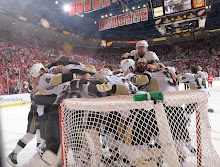
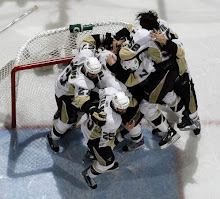

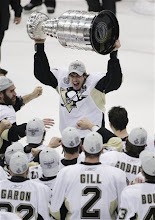
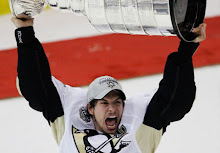
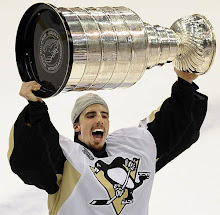

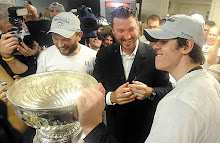
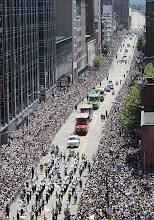



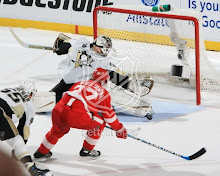
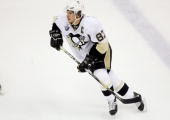
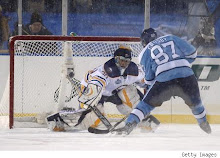
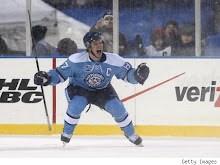
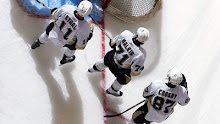

No comments:
Post a Comment